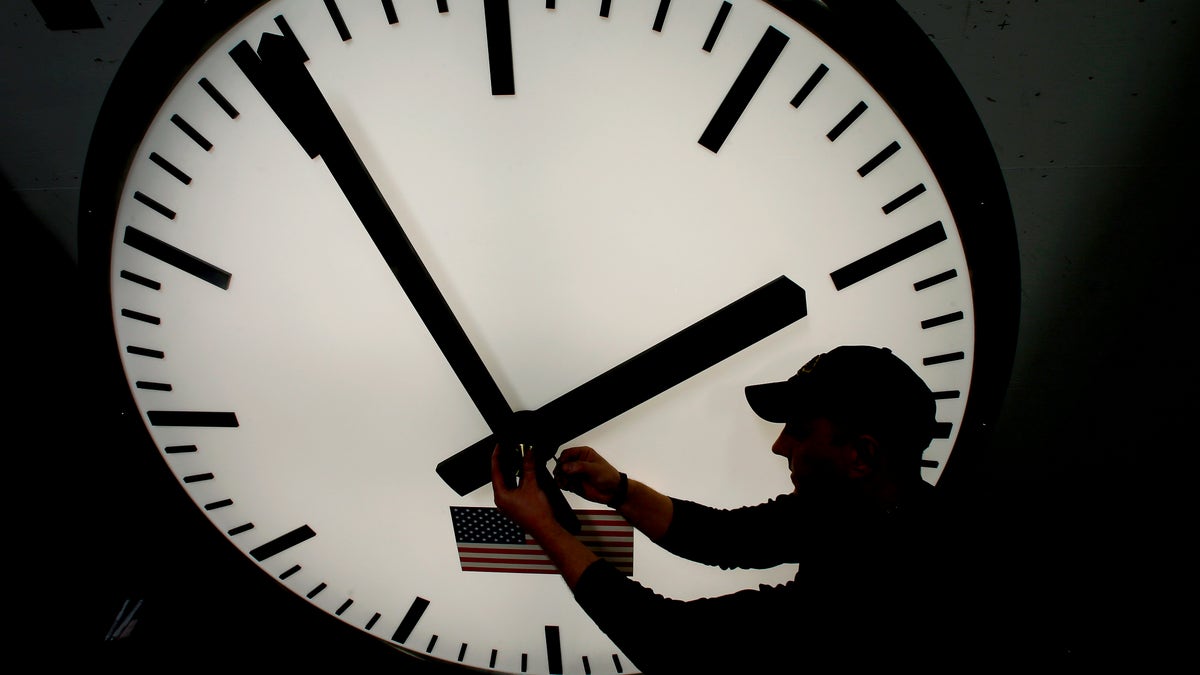
March 7, 2013: Dave LeMote uses an allen wrench to adjust hands on a stainless steel tower clock at Electric Time Company, Inc. in Medfield, Mass. (AP)
Whether you blame it on the French, the English, the Germans or Benjamin Franklin, the scourge of daylight saving time will strike at 2 a.m. Sunday and create havoc for the hapless American worker. And it all started as a joke.
The elderly Benjamin Franklin, said to enjoy a robust social life in Paris as the American envoy, after bit of an all-nighter was once unhappily woken by the morning sunlight at 6 a.m. Annoyed, as any red-blooded American would be, he penned a bit of satire.
The French, Franklin wrote, could save the modern-day equivalent of $200 million “through the economy of using sunshine instead of candles” if they moved their clocks ahead by an hour. Naturally, politicians could not take a joke and turned farce into fact, and poor Ben’s name has been defamed ever since as the founding father of daylight saving time.
Still, this pained idea was championed by an Englishman named William Willett, an earnest man and obviously the kind of offensively cheerful person who can make anyone’s morning a nightmare. Willet wrote a brochure titled “The Waste of Daylight” in 1907. He preached the gospel of “summer time,” proving once again that the American colonists were wise to fight a war to distance ourselves from tyranny.
But it wasn’t until World War I that the Germans actually implemented the idea, and it crossed the ocean to the U.S. in 1918. Now, 100 years later, perhaps it’s time to send it back.
Having grown up much of my life in rural areas, I had long heard the slur that the rest of the country was forced to reset all their clocks to accommodate the American farmer. Not true. No matter how hard they tried, farmers couldn’t convince the cows to adjust their wristwatches and alarm clocks.
Milking and harvesting cycles remained the same, with only the laborers all the more tired. In fact, big businesses with all their political power held firm against an attempt in 1919 to repeal the torture, one more offense that can be laid against them if anyone is keeping score this far out from the next election.
Despite the international birth of daylight saving time, most nations in the world have managed to avoid this obsessive fiddling with sleep. Fewer than 40 percent of countries endure the switch, while more than 140 countries gave it a shot and came to their senses … on that first day after they tried it most likely, when people looked at each other with bleary eyes and asked: “Why are we doing this?”
A 2016 Rasmussen Report found, shockingly, that Americans are not crazy about daylight saving time, reporting, “only 35 percent consider the time change worth the hassle.”
Perhaps scientists needs to retool the search for alien life in the SETI Institute to locate and identify the sadists who wish to see the rest of us woken at unnatural hours. Still, some claim it leads to energy savings, so in the name of saving the planet, does it?
The Department of Energy looked into the matter to determine just how much energy was conserved by this jarring shift in the time-space continuum, and found that the answer was not much if anything. Why? Because it turns out that if you get up early and it’s dark, you turn on the light, while if you stay up late and it’s dark, you turn on the light. This is the kind of cutting edge analysis that keeps government at full employment.
In fact, when the state of Indiana, which had held out against the peer pressure of shifting time like its neighbors, finally caved in 2006, researchers found that electrical usage rose, leading to “an extra $9 million” in spending.
Analysis shows that for ordinary Americans changing schedules is not that easy. In an article in Journal of Applied Psychology, a study revealed that on the Monday after the time change there were an increased number of workplace injuries, some of them likely caused when sleepy co-workers are confronted with that one early bird who is chirping about getting that proverbial worm.
And the abrupt time shift has been linked to all kinds of health issues, or at least all kinds of reported health issues as people sleep in, calling in sick to work.
Add to that the fact that no matter when you shift the clock, eventually, it will get dark. In fact, New York City’s Mayor Bill de Blasio announced a $1.5 million “dusk and darkness” safety campaign to communicate to those in the Big Apple that when it gets dark, it’s easier to bang into things, such as with cars.
So pay attention when the government launches an ad campaign that parrots our mothers … be careful when the sun goes down.
Since farce became fact when Ben Franklin’s prose became policy, let’s look to a comedy for relief. Fictional Congressman Jonah Ryan, on the award-winning comedy “VEEP,” introduced a pretend bill to end daylight saving time, saying the measure “will be a call for less government.” Sounds like an idea with actual bipartisan potential.
It’s time to end daylight saving time. Who’s with me?